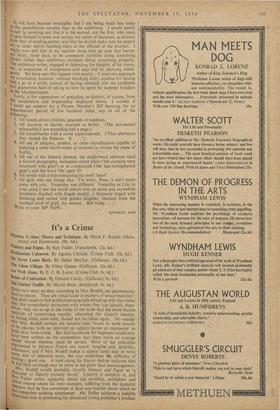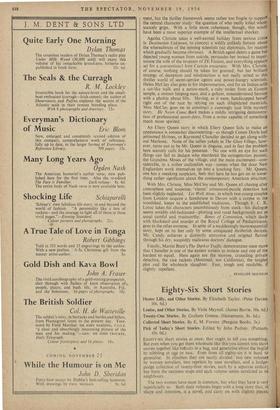It's a Crime
Fantasy and Fugue.* Roy Fuller. (Verschoyle. 12s. 6d.)
Bones of Contention. By Edward Candy. (Gollancz. 9s. 6d.) The' Darker Traffic. By Martin Brett. (Reinhardt. 9s. 6d.)
ment, but the thriller framework seems rather too fragile to support the central character study: the question of who really killed whom scarcely grips. With a little more coherence, though, this would have been a most superior example of the intellectual shocker.
Agatha Christie takes a well-earned holiday from serious crime in Destination Unknown, to concoct a wildly unlikely fantasy about the whereabouts of the missing scientists (no diplomats, for reasons which gradually become obvious). A British agent deters a game but dejected young woman from suicide, persuades her instead to imper- sonate the wife of the inventor of ZE Fission, and everything appears set for a conventional Iron Curtain excursion. With Mrs. Christie, of course, nothing should be taken for granted; but her brilliant strategy of deception and misdirection is not really suited to this thriller world of secret-service agents and power-hungry scientists. Helen McCloy also goes in for impersonation, and for an Indian with a cat-like walk and a tattoo-mark, a ruby stolen from an Eastern temple, a sinister limping man, and a gallant, misunderstood heroine with a phobia about lifts. Having, as it were, handicapped herself right out of the race by relying on such dilapidated materials, Miss McCloy goes on to construct a cunningly taut little mystery story. He Never Came Back makes a mildly intriguing demonstra- tion of professional savoir-faire, from a writer capable of something much more spirited.
Art Ellery Queen story in which Ellery Queen fails to make an appearance is somewhat disconcerting--as though Conan Doyle had jettisoned Holmes, or Raymond Chandler decided to get along with- out Marlowe. None of the sullen yokels in The Glass Village, how- ever, turns out to be Mr. Queen in disguise, and in fact the problem here scarcely calls for his presence: No one with an eye for such things can fail to deduce who murdered the 'octogenarian painter, the Grandma Moses of the village, and the main excitement—con- siderable, in a rather outlandish way—comes when the dour New Englanders work themselves up into a lynching fury. Mr. Queen, one has a sneaking suspicion, feels that here he has got on to some- thing rather significant about the contemporary American situation.
With Mrs. Christie, Miss McCloy and Mr. Queen all chaSing after atmosphere and suspense, 'classic' crossword-puzzle detection has been slightly neglected. Let Well Alone, in which two young couples from London acquire a farmhouse in Devon with a corpse in the woodshed, keeps to the established traditions. Though E. C. R. Lorac takes his characters unambitiously from stock—his dialogue seems notably old-fashioned—plotting and rural backgrounds are as usual careful and trustworthy. Bones of Contention, which deals with blackmail and murder at the Royal College of Paediatricians, goes to the other extreme. In spite of a maddeningly inconsequential story, kept on its feet only by some antiquated thrillerish devices, Mr. Candy, achieves a distinctly attractive and original flavour through his dry, waspishly malicious doctors' dialogue.
Finally, Martin Brett's The Darker Traffic demonstrates once more that Chandler is one of the easiest writers to imitate and one of the hardest to equal. Here again are the morose, crusading private detective, the vice rackets (Montreal, not California), the tangled plot and the wholesale slaughter. Fast, tough and readable, if slightly repellent.
PENELOPE HOUSTON











































































 Previous page
Previous page